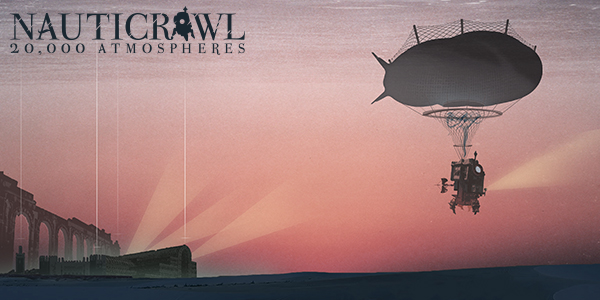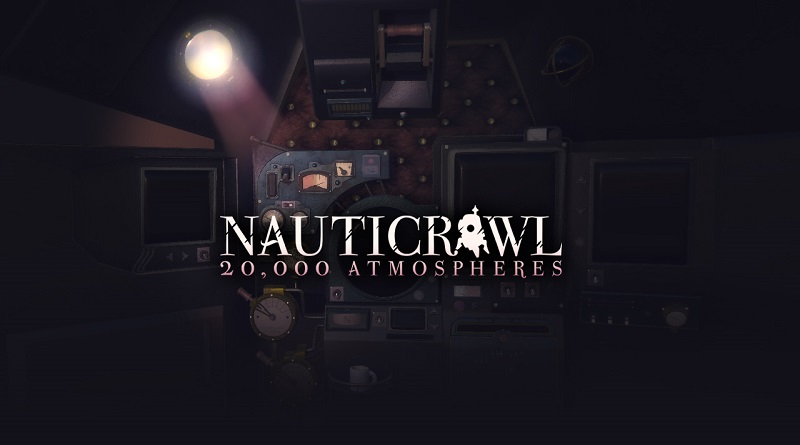So here I am dropped in a cockpit with barely two lines of explanation for any luggage. My screen displays joysticks, buttons and other dials. Nothing moves as I turn my head around to look for clues as to how to proceed. I am aboard a nauticrawl, these vehicles with a steampunk look whose driving is so technical that it seems to be reserved for the aristocracy.
Apparently I ran away, not knowing who, why, let alone where to go. But before I know more, I'm going to have to start it up. Abandoned, wrapped in metal, with only the vibrations of the water disturbing the silence of the inert cabin as company: rarely has a game made me feel so alone in front of its interface.
After a few minutes of pulling all the levers and pressing all the visible buttons, I raise my head and try to operate this joystick that I had not yet seen. Suddenly some lights come on: I obviously turned on the battery, which will allow me to turn on the on-board computer. The screens flicker faintly and tell me the state of my nauticrawl. First priority: start the engine, because without power the battery will quickly run down. And we went back for a click session on everything around me to find the right button.
This discovery phase is a pleasure, no unsightly popup or highlighted element disturbs the heavy and worrying atmosphere of the cabin. But now that the engine is purring, I can follow the start procedure and activate the sonar. I've already spent twenty minutes thinking about what to do, it's high time to get moving.
The movements are particular and not at all intuitive at first sight. We advance by flea jump; we start by adjusting the distance to be covered with a lever, we open more or less the gases with another one (the more open they are, the faster the reloading of the jump will be) and we pull a lever. In an uncomfortable metallic crash, the vehicle shakes and the sonar shows us our new position.
It's your only way to find your way around: no windows to observe the fish, barely a periscope to observe objects captured by the sonar (in the form of a report on the on-board computer). This is an elegant trick to avoid having to graphically represent the environment. You may also find it lazy, but I think it strongly contributes to the atmosphere. Would it have been transcended by a 3D engine to show us the outside? I'm not sure.
Obviously, I turned on all the equipment I knew how to activate, and because it's not Versailles here, after a few hazardous moves, I'm informed that the battery is soon flat. By the time I understand the energy management on board between the different elements, everything is shut down. No matter how hard I push the buttons, nothing happens: only the eject control unlocks and this is my first death, due to the empty battery.
Rest assured, after this failure, I came back even more motivated, determined not to lose in the same way. I succeeded: this time I didn't have to leave the cabin and drown because I left the fog lights and the car radio on, but because of a dry run. Fuel burns quickly when you push all the buttons to the limit.
I later discovered many other ways to serve as aperitif for sharks, while learning more and more about this harshly hostile universe. Turrets force me to activate invisibility to escape them, which sucks the battery at a crazy speed. Kind of octopuses chase me along narrow corridors to open me like a can.
I find falsified coats of arms that are supposed to give me a few seconds' respite in case of scanning by sentinels. And other empty nauticrawls lie on the bottom of the water, witnesses of attempts similar to mine, aborted in pain. However, they contain equipment that is essential to continue on your way, such as new batteries or fuel reserves.
It is thus, by dodging the dangers and searching the various remains and devices on which I can connect, that I progress in these labyrinthine flows. I find bits of discussion, clues about the existence of various places or advice in the form of notes. Everything remains cryptic, mysterious, at no time does the game take you by the hand (except to show you the way out, when it is too late).
So I was wading down to the bottom of the water, until I found a crystal that I didn't pay much attention to at first. However, it was to him that I turned when, tired of having gone around the place three times and short of resources, I used all the equipment I had collected in the hope of unlocking the rest of the adventure. Some texts found here and there suggested that there was a way to rise above the water and without saying much, expect to change altitude.
A large part of the pleasure of discovering the game therefore lies in this interface. Yet it is unnecessarily complicated, counter-intuitive and sometimes painful. Once the underwater vehicle is assimilated, we will have to learn another (albeit simpler) before we can resume our maritime explorations.
But it is also this interface that gives Nauticrawl style and character. More than an atmosphere, it offers an atmosphere. The subtitle of the game announces 20,000 of them in a tribute to Jules Verne, I must admit that I only counted one and it is already not given to everyone to have such a successful one.
Fighting against your machine, looking for the right settings with random precision, all in panic under the threat of an octopus you're trying to escape by making a chaotic U-turn because this damn machine can only go forward, is surprisingly pleasant and even rewarding when you can pretty much control it.
As I have suggested several times, Nauticrawl is a merciless game. The slightest mistake is paid for in cash, and even when you know more about how the game works, you can't always get away with it because of the heaviness of the animal you are driving. I personally have not been put off by this difficulty, but we must be aware that we are in the presence of a rogue-like: we start from scratch with each death. The background elements already discovered and the mysteries thwarted are to be relearned, no progress is preserved.
I keep as much information as possible about the universe and your mission because all the salt of adventure is in the discovery. Anyway, I can't spoil everything: I haven't managed to get through it yet. The gameplay is simple but the interface knows how to make it difficult to do anything.
The graphics are clean but limited to the display of the cockpit and the few cathode screens that compose it. On the other hand, the sound atmosphere is very good, with these muffled noises and squeaky levers. The adventure is sensory and it is the headphones on the ears that you can fully appreciate it.
Nauticrawl is full of good ideas, whatever happens an original experience and I consider his work on the remarkable interface of creativity. Surviving at the bottom is worth it and progressing from place to place brings its share of stress because the slightest movement is a risk taking that can bring you back to the main screen (also very successfully designed).
Offering so much intensity by displaying so little on the screen is a great feat by Andrea Interguglielmi (former Dreamworks or Lionhead). This is undoubtedly what earned Nauticrawl a nomination for the IndieCade 2019. To learn more about this Italian author and his work, I invite you to listen to the Dark Station podcast below:
The French translation is of a quality to be noted, nothing is lost in the process, whether it is the meaning or the atmosphere that these texts reinforce. Nauticrawl may not appeal to everyone, especially those who expect an easy-to-handle experience and who like a more visual representation in their games. Those who are curious to dive into it will find a game that is richer than it looks and that is as immersive as it can be frustrating.






